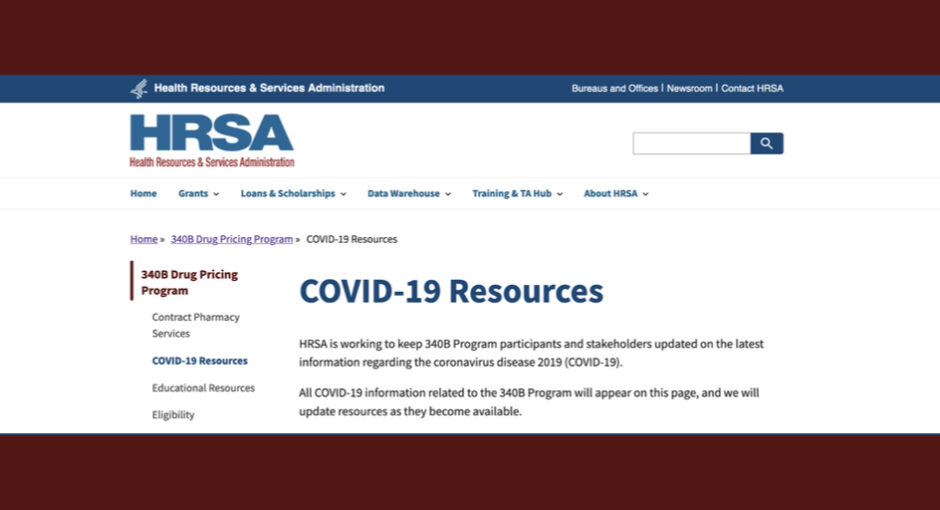The U.S. Center for Medicare & Medicaid Services encouraged health care providers on its blog last month “to prepare for the end” of its COVID-19 waivers and flexibilities “as soon as possible and to begin moving forward to reestablishing previous health and safety standards and billing practices.”
340B covered entities meanwhile are wondering if remote compliance audits or other 340B program flexibilities granted by the U.S. Health Resources and Services Administration (HRSA) during the pandemic might endure and become permanent 340B program features.
HRSA officials were not immediately available for comment on which additional flexibilities might be made permanent and on whether the agency would seek public input on the issue.
In March 2020, HRSA added a page to the 340B program website describing “general flexibilities that covered entities should adhere to during this public health emergency.” In June 2020, HRSA said two would remain regardless of the COVID-19 pandemic—one dealing with the use of telehealth technology in the 340B program and another related to the use of 340B drugs in offsite outpatient facilities not yet listed as reimbursable on a hospital’s Medicare cost report.
Other 340B program flexibilities HRSA put in place during the COVID-10 public health emergency include:
- Allowing some entities, upon request and review, to enroll immediately in 340B without having to wait for the next calendar quarter.
- Exempting 340B site registration requirements on a case-by-case basis.
- Allowing remote audits of covered entities, and in some cases, granting extra time to respond to audit deadlines.
- Allowing some hospitals not usually qualified to buy drugs though a group purchasing organization to purchase through a GPO if they cannot get the 340B price or wholesale acquisition cost price due to shortages and not requiring reporting of this information to HRSA.
Shahid Zaman, Policy Manager for America’s Essential Hospitals, told 340B Report that the COVID flexibilities were helpful during the pandemic and added that HRSA should give 340B providers clarity as the PHE winds down.
“The flexibilities have allowed 340B hospitals to focus on providing lifesaving care to their patients in marginalized communities and expand their scarce resources while not being overburdened with logistical requirements,” he said. “As the public health emergency declaration comes to an end, it will be critical that HRSA clearly communicate to stakeholders which flexibilities will expire and provide a seamless transition that doesn’t disrupt the provision of care.”
He added, “We hope HRSA will identify ways to continue to minimize the burden on 340B hospitals so they can continue to fulfill their missions of stretching their scarce resources to serve low-income patients.”
One congressionally mandated 340B program flexibility is due to lapse at the end of this year.
In March as part of the Consolidated Appropriations Act, Congress allowed hospitals terminated from 340B during the pandemic because their Medicare disproportionate share (DSH) adjustment percentage fell below 340B statutory requirements as a consequence of the pandemic to apply for readmission.
The hospital must have been terminated from 340B during Medicare cost reporting periods ending no later than December 31, 2022. HRSA on the Office of Pharmacy Affairs home page asks hospitals that believe they are eligible for the exception to the DSH percentage requirement but have not yet been contacted by the agency to please contact Apexus, the 340B Prime Vendor. It says requests will be handled on a case by case basis.
CMS said in its Aug. 18 blog post that U.S. Health and Human Services (HHS) Secretary Xavier Becerra would give states and the health care community 60 days’ notice before ending the PHE. The last 90-day extension of the emergency was on July 15.
“It seems unlikely … that the PHE will end in mid-October since the 60-day early warning for governors has come and gone,” American Hospital Association spokesperson Colin Milligan said. “It seems like it will likely go through early 2023.”
AHA sent a letter to Becerra in July, asking him to renew the PHE rather than let it lapse in October, arguing that the PHE was necessary to ensure continuation of critical waivers and other flexibilities and to minimize additional disruption to the healthcare delivery system.


